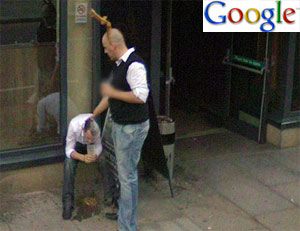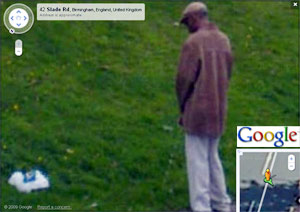 The UK’s Information Commissioner has ruled that Google’s Street View is not a threat to privacy after mulling over an official appeal by privacy campaigners, Privacy International.
The UK’s Information Commissioner has ruled that Google’s Street View is not a threat to privacy after mulling over an official appeal by privacy campaigners, Privacy International.
Launched in the UK last month, the nifty add-on to Google Maps and Google Earth lets users view an unfurling panorama of pannable, zoomable street-level photographs of major streets and cities.
A requirement of the Information Commissioner’s Office (ICO) was that Google should blur all the faces and license plates it finds, but the automatic face detecting technology seems to have had a bit of a wobble, with Privacy International claiming it had seen at least 200 images where people’s faces were not obfuscated.
While some of the more amusing photos from the service became the toast of the Internet before Google could scrub them off, Privacy International remained unimpressed.
The ICO has now ruled that “there is no clear evidence that the community find Street View particularly harmful or insidious,” adding that, “if consent were required by the law, then the producers of, say, Match of the Day, would have to gain the consent of all people attending televised football matches who might be caught on camera.”
However, the ICO also said it would continue to monitor the Street View service and get on Google’s case if they have fail to remove inappropriate images. Privacy International has commented that it was “disappointed at the findings”.
EU to sue UK over Internet privacy
Elsewhere, the European commission has called for the UK’s privacy laws to be tightened to protect web users, as the Guardian reported yesterday:
 “In her weekly internet address, EU telecoms commissioner Viviane Reding warned: “Do you want to turn the internet into a jungle? This could happen if we cannot control the use of our information online. There is an undeniable risk that privacy is being lost to the brave new world of intrusive technologies.”
“In her weekly internet address, EU telecoms commissioner Viviane Reding warned: “Do you want to turn the internet into a jungle? This could happen if we cannot control the use of our information online. There is an undeniable risk that privacy is being lost to the brave new world of intrusive technologies.”
The commission’s legal action, which could result in the government being dragged before the European court of justice, centres on the handling of controversial online advertising technology developed by UK-based Phorm which has been tested by BT in the UK and cleared by the authorities.
That technology enables internet service providers (ISPs) to track what a user does on the internet to create a list of their interests which can be used to show them more relevant adverts on websites they subsequently visit. While heralded by ISPs and media companies as a way of making more money from internet advertising, a market dominated in the UK by Google, it has been widely criticised by privacy campaigners and the web’s creator, Sir Tim Berners-Lee, as unjustifiable online snooping.
The commission said yesterday that the UK needed to tighten its laws to ensure that consumers were required to consent before their online activity was monitored for so-called behavioural-targeted advertising services. The current UK law allows traffic to be intercepted if the company doing the intercepting has “reasonable grounds for believing” that it has consent.
A spokeswoman for the Home Office said it had received notice of the infringement proceedings and would respond “in due course”. The government has two months to put forward its defence.”
Comments
6 responses to “Google Street View Gets OK; EU To Sue UK Over Privacy”
[…] here: Google Street View Gets OK; EU To Sue UK Over Privacy Tags: google-earth, mulling-over, nifty, official-appeal, should-follow, street-view, […]
[…] and would respond
it’s a shame the international privacy people haven’t anything better to do. it’s still photo’s at least weeks old if not months or years with no way of pinning down when as far as i am aware.
i would have no objection to my face or house apearing at all, for one thing my house has changed since it’s picture was taken nearly 2 years ago
I think Streetview and Phorm are very different things, I would hope noone would argue otherwise..
I can’t help wondering how many of the people outraged by Street view have photos of themselves and their homes on their photo sharing sites/profiles, etc.
[…] Digital-Lifestyles placed an observative post today on Google Street View Gets OK; EU To Sue UK Over PrivacyHere’s a quick excerptPosted by Mike Slocombe on 16 April 2009 at 1:00 pm | Tagged as: UK, Google, Legal The UK’s Information Commissioner has ruled that Google’s Street View is not a threat to privacy after mulling over an official appeal by privacy campaigners, Privacy International.Launched in the UK last month, the nifty add-on to Google Maps and Google Earth lets users view an unfurling panorama of pannable, zoomable street-level photographs of major streets and cities. A requirement of the Information Commis […]
[…] yammering put an intriguing blog post on Comment on Google Street View Gets OK; EU To Sue UK Over Privacy by…Here’s a quick excerpt…month, the nifty add-on to Google Maps and Google Earth lets users view an unfurling panorama of pannable, zoomable street-level photographs… […]